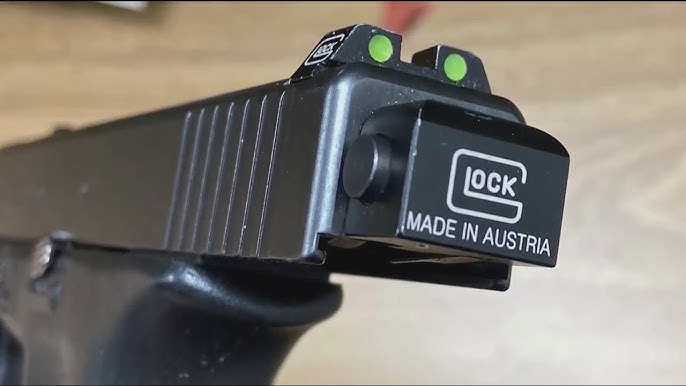Earlier this year, the City of Chicago sued US gun manufacturer Glock. The city alleges that Glock has made the “business decision” to profit from the sale of handguns that can be easily converted into machine guns using 3D printable converters called auto sears.
Matthew Larosiere, a 3D printed firearms advocate, has spoken out against Chicago’s allegations. Known on X as @MattLaAtLaw, Larosiere told 3D Printing Industry that this “fundamentally unserious lawsuit” will “almost certainly be unsuccessful.”
Colloquially known as “Glock switches,” the machine gun converters are allegedly cheap and easy to produce using readily available online files and desktop 3D printers. They enable semi-automatic Glock pistols to fire up to 1,200 rounds per minute, faster than the standard M4 rifle used by the US military.
The Bureau of Alcohol, Tobacco, Firearms and Explosives (ATF) reported a 400% increase in recoveries of illegally modified machine guns from 2020 to 2021 throughout the US. From 2021 to December 31, 2023, over 1,100 modified Glocks were recovered by the Chicago Police Department (CPD).
Converted firearms have been linked to increasing gun crime in Chicago. Glock switches have been connected to homicides, aggravated assaults, batteries, kidnappings, burglaries, home invasions, carjackings, and attempted robberies.
Larosiere believes the Chicago vs Glock lawsuit is plagued by legal flaws and asserted that firearm manufacturers do not bear responsibility for restricting the use of auto sears.
He argued that machine gun converters are protected under the Constitution and downplayed the impact of 3D printing on rising gun violence in the U.S.
Larosiere also shared his views on how to tackle gun-related crime in the US, pointing to broader systemic societal issues as the root cause.
We want to hear your views on 3D printed guns and Glock switches? Share your thoughts with me by e-mail at [email protected] or via LinkedIn. Your insights could help shape a follow-up article on this topic.

Is Chicago’s lawsuit against Glock legally flawed?
The City of Chicago first filed its complaint against Glock in Cook County Circuit Court in March 2024. The company rejected the City’s claims, moving the lawsuit to federal court and arguing that federal law protects them from the criminal actions of third parties. This led Chicago to drop the initial suit on 22 July and simultaneously file an updated complaint back in Cook County.
Larosiere, a partner at Zermay Law Group and former Director of Legal Policy at the Firearms Policy Coalition, believes Chicago’s updated lawsuit is legally flawed. He argued it “conflates provisions from different laws and jurisdictions in an attempt to manufacture a new type of liability that doesn’t exist.”
This revised version includes additional claims against two gun stores, Midwest Sporting Goods and Eagle Sports Range, reportedly linked to crimes in the Chicago area. Chicago calls these “some of the most irresponsible gun stores in the country.” It also levied new counts against Glock Ges.m.b.H, an Austrian corporate affiliate of Glock.
Larosiere believes the suit “isn’t predicated on any particular damages flowing from a particular Glock product.” Instead, it “attempts to heap liability” on the gunmaker and stores for a “non-particularized purported injury to the city.” Larosiere instead places blame on the “third parties converting the firearms,” for rising crime activity in Chicago.
The city claims that Glock, the largest gun manufacturer in the US, has deceptively marketed its pistols, and lies about its commitment to community safety.
According to the plaintiffs, the company has failed to institute safeguards preventing the conversion of its firearms into machine guns – which have been outlawed in America since the 1930s.
However, Larosiere argued that installing Glock Switches isn’t as straightforward as the lawsuit makes out. “Glocks aren’t particularly easy to convert to fire automatically,” he explained. He asserted that the handguns are extensively engineered to prevent them from firing automatically.
Chicago credits Glock’s popularity in the criminal market to the ease at which they can be modified. This is challenged by Larosiere, who flipped this argument on its head. He believes Glock handguns are being disproportionately converted because they are the “de-facto personal defense firearm.”
“The real reason Glock switches are so common isn’t because Glock handguns are particularly easy to convert,” he emphasized. “It’s because Americans want to shoot fast, and Glock handguns are popular and available.”
Larosiere believes that if another gun manufacturer replaced Glock as the highest-selling firearm company in the US, they would be having their products modified at the same rate. Conversely, Chicago argues that other popular handgun manufacturers have made more concerted efforts to prevent the illegal modification of their products.
For instance, firearms from Smith & Wesson, Sig Sauer, Springfield Armory, and Walther Arms, reportedly require more lengthy and skilled engineering to be modified, according to the lawsuit.
The plaintiffs point to multiple internal and external modifications which would make Glock’s harder to modify. Jorge Leon, who patented an early Glock auto sear design called the “Fire Selector System” in 1996, believes handgun design changes could render Glock switches obsolete.

A defense for 3D printed firearm components
Are 3D printable Glock switches protected by the Second Amendment to the U.S. Constitution? According to Larosiere, the answer is an emphatic yes. He argued that the Constitution extends prima facie “to all arms and accoutrement.”
Larosiere believes that limitations introduced by more “milquetoast gun owners” are not derived from American legal texts, history, or tradition. Any limitations on the peaceable use of arms would, he added, have to flow from “common law nuisance.”
The pro-gun advocate stated that there is no rational basis for claiming automatic weapons are more of a threat or nuisance than any other firearms. “They aren’t like explosives where nuisance-type harm necessarily flows from their use.”
Additionally, risks are said to be an inevitable consequence of freedom, and stifling this would create a world without “love, profit, intrigue, success, or really anything fun.” He commented that restraints on human liberty for security, “usually damage both liberty and security.”
Larosiere also opposes the view that 3D printing is fuelling gun crime. He suggested that most machine gun converters are surreptitiously imported, and not made domestically on 3D printers.
On the other hand, Chicago’s lawsuit asserts that “most auto sears that originate in the United States are produced using 3D printers.” This reportedly makes tracing, intercepting and eradicating the converters a daunting task.

Will lawsuits reduce US gun violence?
Larosiere believes that lawsuits against firearm manufacturers will not solve the problem of gun violence in America. He added that the Chicago vs Glock lawsuit is in “no way calculated to address or improve the situation” of violent crime or gun violence.
He cited previous legal efforts that failed and left plaintiffs, including victim families, to cover the substantial legal fees of defendants. This is known as “revictimizing the victims,” something Larosiere calls “frankly concerning.”
Even if Chicago wins its lawsuit against Glock, Larosiere doubts that the legal outcome would have any meaningful effect on the availability of 3D printed Glock switches.
“Nobody who 3D printed anything would be materially impacted by a Chicago win,” he explained, adding that targeting manufacturers will not curb the demand for such modifications.
Therefore, instead of pursuing lawsuits against manufacturers, Larosiere suggested a more systemic approach is needed to address the root causes of gun violence. “We must find out why the crimes are happening in the first place, and whether our proposed solution would address the harm we seek to prevent.”
He doubts that regulating 3D printing or DIY firearms would have a significant impact on violent crime given that most of this has been driven by the “nucleus of the drug war.” Therefore, “easing up on the war on drugs” might make the drug trade “ever so slightly less violent,” reducing associated gun crime in the process.
We want to hear your views on 3D printed guns and Glock switches? Share your thoughts with me by e-mail at [email protected] or via LinkedIn. Your insights could help shape a follow-up article on this topic.
Want to help select the winners of the 2024 3D Printing Industry Awards? Join the Expert Committee today.
What does the future of 3D printing hold?
What near-term 3D printing trends have been highlighted by industry experts?
Subscribe to the 3D Printing Industry newsletter to keep up to date with the latest 3D printing news.
You can also follow us on Twitter, like our Facebook page, and subscribe to the 3D Printing Industry Youtube channel to access more exclusive content.
Featured image shows pro-gun advocate Matthew Larosiere. Photo via Matthew Larosiere.


